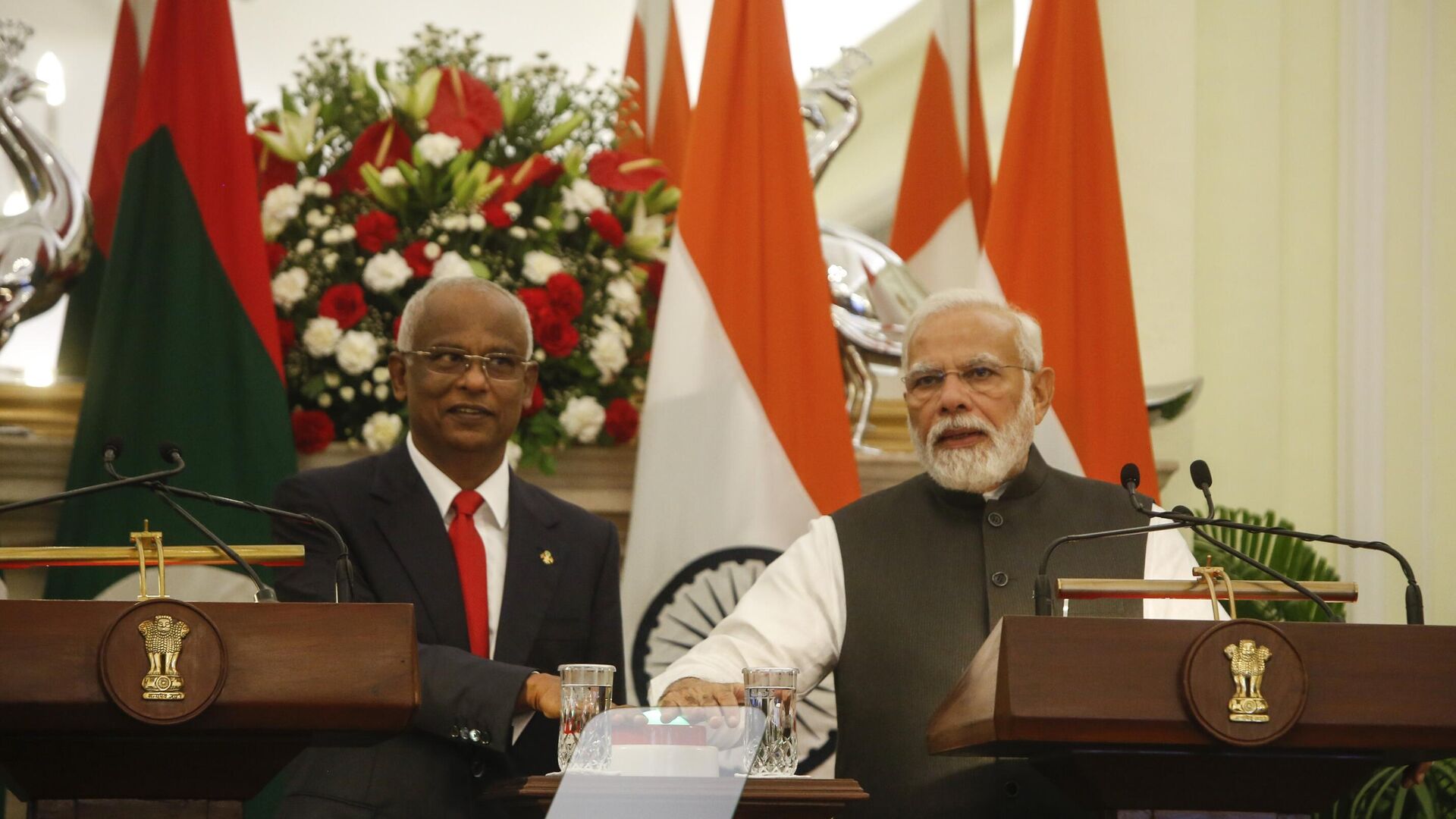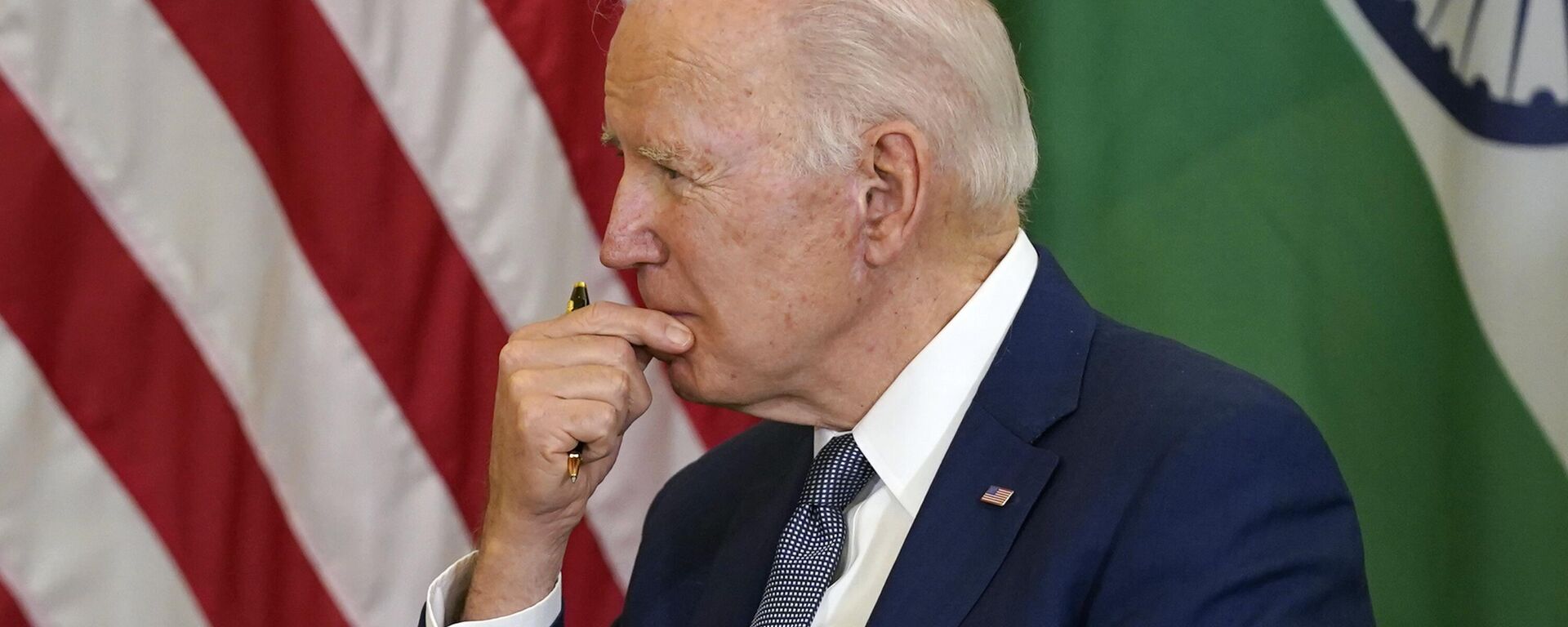https://sputniknews.in/20231005/could-maldives-really-do-without-military-assistance-from-india-4616294.html
Can Maldives Survive Without Indian Military Assistance?
Can Maldives Survive Without Indian Military Assistance?
Sputnik India
Maldives President-elect Mohamed Muizzu has conveyed to New Delhi that he intends to carry out his election pledge of removing all “foreign troops” from the country as soon as he assumed office on 17 November.
2023-10-05T16:21+0530
2023-10-05T16:21+0530
2023-10-10T12:46+0530
sputnik opinion
narendra modi
xi jinping
india
maldives
china
indian ocean
military coup
coup attempt
defense sector
https://cdn1.img.sputniknews.in/img/07e7/0a/05/4618603_0:220:2860:1829_1920x0_80_0_0_5b34b39b967f465d6cbd171028189889.jpg
Maldives President-elect Mohamed Muizzu has conveyed to New Delhi that he intends to carry out his election pledge of removing all “foreign troops” from the country as soon as he assumed office on 17 November, the Maldivian media reported on Thursday.Muizzu met Indian High Commissioner in Male, Munu Mahawar, on Wednesday, the Indian diplomat posted on social media platform X.Indian Prime Minister Narendra Modi has expressed hope that “time-tested” India-Maldives ties would continue to strengthen under Muizzu, in what was one of the first congratulatory messages from a foreign leader.Muizzu, who represents a coalition of Progressive Party of Maldives and People’s National Congress (PNC), said after winning the presidential runoff that no foreign troops would be allowed to stay in the Indian Ocean nation “against the wishes” of the citizens.The PPM-PNC coalition firmly backed the ‘India Out’ campaign during electioneering, making it one of its key planks. The outgoing Maldivian administration, led by the Maldivian Democratic Party (MDP), championed the ‘India First’ policyNow, Muizzu’s election win has created some concerns in Indian strategic community over the future trajectory of India-Maldives ties.Some Indian analysts have suggested that Muizzu could take a pro-China stance, given that he is backed by PPM chief Abdulla Yameen, a former President under who Maldives acceded to the Beijing-backed Belt and Road Initiative (BRI). In recent years, there has been a sense of growing strategic competition between India and China, which has been seen playing out in South Asian nations, which have traditionally been closer to New Delhi due to geographical and cultural heritage. Over the last decade, almost every South Asian nation barring India has signed up to the BRI, in a sign of Beijing's growing influence in the region.Indian Security Assistance Critical for Maldives, Analyst SuggestsAgainst the backdrop concerns raised in sections of Indian strategic affairs community, an Indian strategic affairs expert has told Sputnik India that Maldives would be unable to meet its “exigencies” without Indian military assistance.He highlighted India’s military assistance has been found to be crucial for Maldives during Operation Cactus, a 1988-era incident when Indian military helped avert a coup on the island nation.In fact, Moorthy said that even Maldives was critical for India for its security interests in the Indian Ocean Region (IOR).Maldivian Nationalism Shouldn’t be ‘Confused’ with a Pro-China StanceMoorthy further cautioned that the Maldivian nationalism which is being espoused by the incoming Maldivian government shouldn’t be “confused” with the notion that Muizzu is closer to China than India.Moorthy expressed hope that Muezzu’s ongoing demand of removal of foreign troops was a testing phase for India-Maldives ties.
https://sputniknews.in/20230629/nobody-in-south-asia-wants-to-get-caught-up-in-us-china-rivalry-2737862.html
india
maldives
china
indian ocean
indo-pacific
Sputnik India
feedback.hindi@sputniknews.com
+74956456601
MIA „Rossiya Segodnya“
2023
Dhairya Maheshwari
https://cdn1.img.sputniknews.in/img/07e6/0c/13/138962_0:0:641:640_100x100_80_0_0_2cb44360dbcdf6d84bf4b299cd045917.jpg
Dhairya Maheshwari
https://cdn1.img.sputniknews.in/img/07e6/0c/13/138962_0:0:641:640_100x100_80_0_0_2cb44360dbcdf6d84bf4b299cd045917.jpg
News
en_IN
Sputnik India
feedback.hindi@sputniknews.com
+74956456601
MIA „Rossiya Segodnya“
Sputnik India
feedback.hindi@sputniknews.com
+74956456601
MIA „Rossiya Segodnya“
Dhairya Maheshwari
https://cdn1.img.sputniknews.in/img/07e6/0c/13/138962_0:0:641:640_100x100_80_0_0_2cb44360dbcdf6d84bf4b299cd045917.jpg
maldives president, maldives india relations, india out campaign in maldives, india out campaign, belt and road initiative, maldives elections, maldives election results, mohamed muizzu, ppm-pnc, india china relations, india china standoff, india china ties, india news, maldives news
maldives president, maldives india relations, india out campaign in maldives, india out campaign, belt and road initiative, maldives elections, maldives election results, mohamed muizzu, ppm-pnc, india china relations, india china standoff, india china ties, india news, maldives news
Can Maldives Survive Without Indian Military Assistance?
16:21 05.10.2023 (Updated: 12:46 10.10.2023) Maldives meets around 70 percent of its defense training needs from Indian support, with security cooperation having been a major focus in bilateral ties since 1988.
Maldives President-elect Mohamed Muizzu has conveyed to New Delhi that he intends to carry out his election pledge of
removing all “foreign troops” from the country as soon as he assumed office on 17 November, the Maldivian media reported on Thursday.
Muizzu met Indian High Commissioner in Male, Munu Mahawar, on Wednesday, the Indian diplomat posted on social media platform X.
“Look forward to building on our productive discussions to further enhance India-Maldives relationship,” Mahawar said after the meeting, without specifying further details.
Indian Prime Minister Narendra Modi has expressed hope that “time-tested” India-Maldives ties would continue to strengthen under Muizzu, in what was one of the first congratulatory messages from a foreign leader.
Muizzu, who represents a coalition of Progressive Party of Maldives and People’s National Congress (PNC), said after winning the presidential runoff that no foreign troops would be allowed to stay in the Indian Ocean nation “against the wishes” of the citizens.
The PPM-PNC coalition
firmly backed the ‘India Out’ campaign during electioneering, making it one of its key planks. The outgoing Maldivian administration, led by the Maldivian Democratic Party (MDP), championed the ‘India First’ policy
Now, Muizzu’s election win has created some concerns in Indian strategic community over the future trajectory of India-Maldives ties.
Some Indian analysts have suggested that Muizzu could take a pro-China stance, given that he is backed by PPM chief Abdulla Yameen, a former President under who Maldives acceded to the Beijing-backed Belt and Road Initiative (BRI).
Significantly, Muizzu has met Chinese Ambassador to Male Wang Lixin in one of his first meetings with foreign envoys. Chinese President Xi Jinping has also sent his wishes to Muizzu after his election victory.
In recent years, there has been a sense of growing strategic competition between India and China, which has been seen playing out in South Asian nations, which have traditionally been closer to New Delhi due to geographical and cultural heritage. Over the last decade, almost every South Asian nation barring India has signed up to the BRI, in a sign of Beijing's growing influence in the region.
Indian Security Assistance Critical for Maldives, Analyst Suggests
Against the backdrop concerns raised in sections of Indian strategic affairs community, an Indian strategic affairs expert has told Sputnik India that Maldives would be unable to meet its “exigencies” without Indian military assistance.
“The Maldivian National Defence Force cannot by any stretch of imagination have human and other resources to secure the nation if and when there are threats,” remarked N Sathiya Moorthy, a Chennai-based policy analyst and political commentator.
He highlighted India’s military assistance has been found to be crucial for Maldives during Operation Cactus, a 1988-era incident when Indian military helped avert a coup on the island nation.
“From Operation Cactus (1988), post-tsunami reconstruction (2005) and Male drinking water crisis (2014), India has demonstrated how it could mobilise emergency military operations effortlessly and efficiently. What is this required is a bilateral military cooperation to meet exigencies,” stated Moorthy.
In fact, Moorthy said that even
Maldives was critical for India for its security interests in the Indian Ocean Region (IOR).
“Along with other IOR island nations abutting India, Maldives is both a first line of offence against India and first line of defence for India, if one leaves out carrier group operations,” the Indian expert explained.
Maldivian Nationalism Shouldn’t be ‘Confused’ with a Pro-China Stance
Moorthy further cautioned that the Maldivian nationalism which is being espoused by the incoming Maldivian government shouldn’t be “confused” with the notion that Muizzu is closer to China than India.
“(Former President) Yameen is the author of India First policy, but there were strains under him and some of them may resurface if the Indian strategic community confuses Maldivian nationalism with China's endearments,” the Indian analyst said.
Moorthy expressed hope that Muezzu’s ongoing demand of removal of foreign troops was a testing phase for India-Maldives ties.
“Muizzu's demand for the exit of Indian military personnel should be the first and hopefully the only test,” the expert reckoned.



